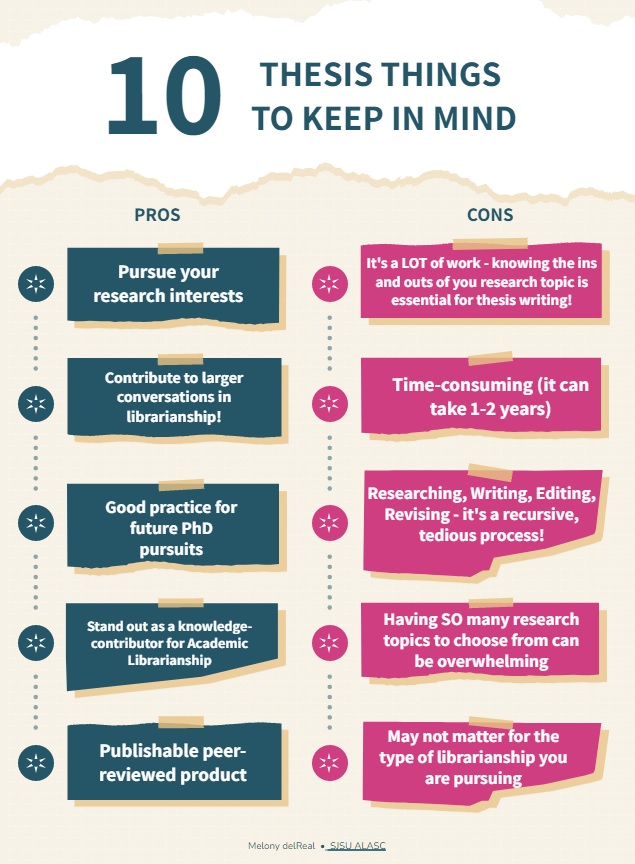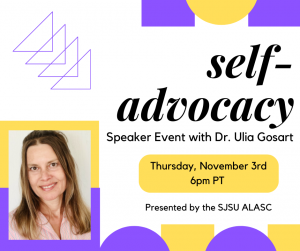. . . that is the question!
Hi there! Melony here, and today I’m sharing with you what I have learned about one of our MLIS’s culminating experience options – the Thesis!
But before I begin, don’t forget to study the iSchool’s invaluable pages exploring, in greater and more authoritative detail, the e-Portfolio and Thesis options.
The inception for this post came about from personal interest – I, myself, am debating on whether to pursue an e-Portfolio culminating experience or a Thesis culminating experience, and perhaps you’re in the same boat too! Having taken my core classes and some electives, I am hoping to get “ahead of the game” for the culminating experience.
Everyone I know who graduated from this SJSU MLIS program went the e-Portfolio route and are either full-time or part-time information professionals. Surely this speaks volumes for the e-Portfolio’s demonstrable effectiveness in displaying SJSU’s MLIS alumni as promising information professionals – and yet the question might be nagging you too, “What about the Thesis option”?
Seeking an answer, I reached out to two faculty members who have been willing to Chair in the past: Dr. Anthony Bernier and Dr. Geoffrey Liu. They replied to the following questions, offering great insight and guidance; direct quotes, paraphrasals, and discussions of their responses are explored under each question:
1. Is the Thesis option a better/wiser option for MLIS students pursuing Academic Librarianship?
The responses from my interview participants for this question were mixed 50/50 – while Dr. Liu advocated strongly in favor of Theses as the better option for aspiring Academic Librarians, Dr. Bernier felt that this question may be treated better on a case-by-case basis.
Dr. Liu’s stance on Theses as the better option based his rationale on the expectations and responsibilities of Academic Librarians, explaining how: “[A]cademic librarians are expected to conduct research and publish just like teaching faculty and go through the same process of performance evaluation for tenure and promotion. The evaluation covers three areas: academic assignment/teaching, service to university/profession, and research/publishing.” This reiterates the concept that I was exposed to – that, if you want to be competitive as a full-time college/university faculty member, scholarly involvement through publishing, conference attendance, and field-participation is highly valuable.
On the flip-side of this, though, was the case-by-case stance, for which Dr. Bernier proposed that the e-Portfolio may be just as effective in exhibiting one’s strong candidacy as an Academic Librarian, minus the time-consuming thesis researching and writing process (which can take anywhere from 1-2 years). He attested that, if you pursue opportunities that will make you competitive in the Academic Library sector (like participating in library conferences as a MLIS student, working as a staff member in this type of library, etc.), and demonstrate these skills in the e-Portfolio culminating experience, relying on the Thesis option is not entirely required or essential. In a sense, this viewpoint advocates for the e-Portfolio’s prowess as a culminating project that showcases MLIS students’ acquired skills in the program, not because it’s easier by any means, but because there is more structure in the process, than the Thesis route, which requires extensive topic-specific research, lengthy document writing, and recursive edits, peer reviews, and approval.
(In any case, being a part of our awesome ALASC club will do nothing but help you stand out in your future information professional positions, no matter what type of career pathway you’re pursuing!)
2. Where might we find completed theses by SJSU MLIS alumni?
To find recent theses from fellow SJSU MLIS alumni, visit the King Library! Dr. Liu offered some great guidance on finding these theses: after navigating to the “Articles and Databases” page on King Library’s website, type in “ProQuest Dissertations and Theses” in the search bar; then, in the Advanced Search for that database, copy/paste “dep(Information Science Library)” in the first field, and copy/paste “sch(San Jose State University)” in the AND field. There you will find 18 more recent published (and captivating) theses from our MLIS program!
3. Are there any areas/topics of modern librarianship that you feel would benefit from the original contribution of a thesis project?
Dr. Liu and Dr. Bernier expressed optimism in the plethora of potential topics that students can begin their thesis journeys on, advocating especially for whatever interests you the most, as “. . . all areas new and old need original research always”!
Some topics that they insightfully recommended were:
- Block chain
- Big data
- Artificial Intelligence
- New Issues & Challenges
- Revisiting/updating previously-conducted research in the field
In conclusion:
If you’re an aspiring Academic Librarian who loves researching, writing publishable documents, and working on your own schedule/structure for a culminating project – I’d absolutely recommend reaching out to prospective Thesis Chair members with your tentative topic ideas (preferably with a written Proposal of your topic ready to present!), and see what they think. There’s no harm in exploring your ideas and options! And, of course, be sure to refer to the handy “10 Thesis Things” at the top of this post, to better weigh your options!
Until next time! 🙂

